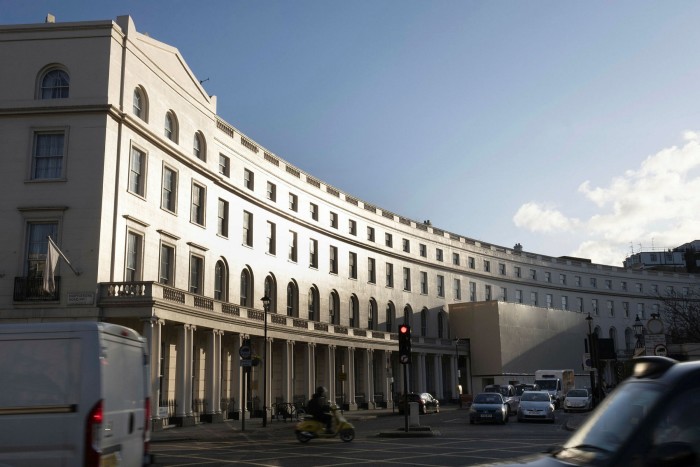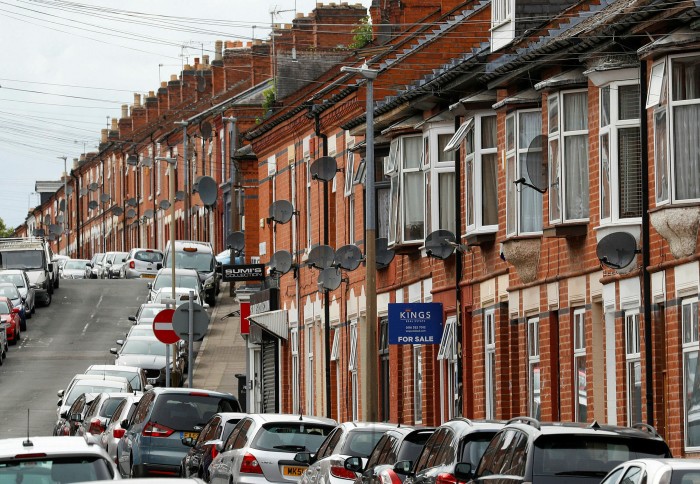Michael Gove’s scheme to hand planning powers to residents is lovely, but unworkable

Roula Khalaf, Editor of the FT, selects her favourite stories in this weekly newsletter.
This article is an on-site version of our Inside Politics newsletter. Sign up here to get the newsletter sent straight to your inbox every weekday
Good morning. Today we examine Michael Gove’s plan to fix the housing crisis, and the Liberal Democrats’ big victories in last week’s local elections. Thank you very much for all of your feedback on yesterday’s fashion dilemma. Get in touch via the email address below.
Inside Politics is edited by Georgina Quach. Follow Stephen on Twitter @stephenkb and please send gossip, thoughts and feedback to insidepolitics@ft.com.
Our latest stories
Windfall tax | Chancellor Rishi Sunak is demanding North Sea oil and gas companies agree to a significant boost to their energy investments in the UK to avoid being hit by a windfall tax.
Loose rules | Ministers made a last-minute decision to ditch plans to force big companies and asset managers to disclose their environmental impact from Tuesday’s Queen’s Speech, according to government sources.
Breaching protocol | The attorney-general Suella Braverman has approved the scrapping of large parts of the Northern Ireland protocol amid mounting government divisions over the plan, reported the Times.
‘Point of no return’ | The EU has vowed to retaliate if the UK rips up the post-Brexit trade deal for Northern Ireland after London’s threat of unilateral action triggered alarm in Brussels and Washington.
Gove, Gove will tear us apart, again
Levelling-up secretary Michael Gove has announced that the UK government will pilot ‘street votes’ — a new scheme which allows neighbours to circumvent the current planning process. Gove plans to give them the right to vote on building new loft conversions, extensions and homes.
The idea started life as the flagship measure of a thought-provoking 2021 paper, Strong Suburbs, published by think-tank Policy Exchange.
Despite some of the headlines you read on the topic, it isn’t a plan designed to allow residents to block their neighbours’ conversions, but rather, a scheme to help neighbourhoods team up to increase the value of their houses.
It’s an elegant solution to one problem of the UK housing market, which is that people want to live in a fancy Georgian terrace that looks a bit like this:

But instead they live in a two-storey terrace that looks a lot like this:

Of course, if you could make it easier for two-storey terraced houses to become six-storey Georgian-style terraced houses, you are potentially unlocking a lot of additional housing capacity. Policy Exchange’s pleasingly elegant solution is that residents of a street could vote to upgrade their homes and pocket some of the monetary gain for themselves — whether cashing in on having a bigger house, renting out the additional property or having some of the receipts from a new buyer.
Will it work? I don’t know. My immediate worry is that the Strong Suburbs proposal does not do enough for housing developers, who would have to juggle the needs of at least half a dozen clients even on the smallest streets, while having to give up some of their own revenue. (That is also the view of most developers I’ve spoken to: they think the scheme is a lovely idea but not one that can work.)
There’s a reason why property developers exist: most ordinary homeowners have no desire to become housebuilders on the side. (I just had my bathroom done: it looks terrific, but frankly the idea of living with the level of work necessary to transform my one-bedroom flat into a two-bedroom one makes me contemplate taking a long walk off a short pier.)
The big problem facing the UK, in my view, is how restrictive planning is. The global problem is that ultra-low rates make housing a very safe investment. Those are the big challenges you have to tackle to get more houses built and more people on the housing ladder.
Of course, plenty of established businesses got their start because “a lovely unworkable idea” turned out to be far from unworkable, and it could well be the case that ‘street votes’ turns out to be such an idea. But there is a reason why US campaigners for more housing are trying to reduce rather than increase the number of veto players in US housing policy, and I’m not convinced that Policy Exchange’s elegant solution will work in practice.
There’s an important ‘but’ here: if I’m right and Policy Exchange is wrong, the only solutions are big, bold and politically painful. These are precisely the sort of things the government has already felt forced to retreat on over housing.
The strange revival of Liberal England
The big winners of this year’s local elections were the Liberal Democrats. They did pretty well against Labour, winning seats in places like Hull and Sunderland, where the party’s liberal bona fides are, if anything, less of an asset. But as far as the struggle for national power is concerned they did two very important things.
The first thing was make big and sweeping council gains in parliamentary seats they already hold. In St Albans, served by MP and Lib Dem deputy leader Daisy Cooper, they hold 50 of the 56 available seats. In Richmond, represented in parliament by Sarah Olney and Munira Wilson, they hold 48 of 54. In Kingston upon Thames, home to MP and Lib Dem leader Sir Ed Davey, they have 41 of 48 seats.
In Westmorland and Furness, which contains former party leader Tim Farron’s parliamentary seat and is the Lib Dems’ most vulnerable constituency in many ways, they have 36 of 65. Coming second with 15 seats is Labour, whose voters will largely vote tactically for Farron in a general election. Meanwhile, the Conservatives, Farron’s main threat, are third with 11.
The second thing they did was make forward strides in seats they hope to win at Westminster in the next election. The Lib Dems made important gains in Stephen Hammond’s Wimbledon seat, Dominic Raab’s Surrey constituency and a host of other target seats where Conservative-voting Remainers congregate in great numbers.
The Lib Dems win seats from the Tories when they can combine the votes of three groups: committed Lib Dems, and what the party’s campaign database describes as ‘pragmatic liberals’ (people who will vote Lib Dem provided the party can win) and ‘soft Conservatives’ (does what it says on the tin) who usually vote Tory but for whatever reason are in the market for an alternative.
One big change in British politics is that Sir Keir Starmer does not frighten ‘soft Conservatives’: Lib Dem campaigners have found it much easier to win votes from the Tories during his leadership than they did under Ed Miliband or Jeremy Corbyn. Added to that, Starmer is not particularly interested in fighting the Lib Dems. He is not a Tony Blair-style coalitionist who yearns for a Labour-Liberal Democrat alliance, or a committed supporter of proportional representation such as Jonathan Reynolds on the party’s right or Clive Lewis on the party’s left. But he is, unlike almost all his would-be successors, someone who is happy to concede the field to the Lib Dems in a number of seats.
If Starmer does end up having to resign over “Beergate”, the biggest losers could end up being the Lib Dems, who have no guarantee that the next Labour leader will be a politician who is as willing to work with them or makes their lives as easy in their target seats.
Now try this
Thanks so much for all the Parisian restaurant suggestions. I will, of course, be travelling by train: the best way to go on holiday anywhere if you ask me. Henry Mance has written about the joys of rail travel experienced on his journey from London to Budapest for FTWeekend.
Comments